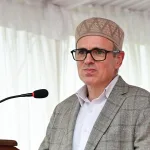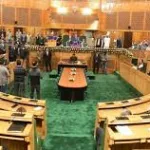FRAGRANCE OF IDEAS
Narendra Modi, the Prime Minister of India, during the last ten years realized three out of the four major dreams of Atal Bihari Vajpayee. These dreams had/have a great significance not only for the BJP (earlier Bhartiya Jana Sangh-BJS) but also for the whole nation keeping in view their deep organizational, ideological and political implications. Vajpayee in some of his famous expressions, on a number of occasions, dwelt upon them publicly and hoped that the dreams would come true one day even if those couldn’t be realized during his own life time. He left no occasion to talk about them and would motivate both his cadres and the people to remain committed to those ideals that inspired their lives and work towards their accomplishment.
Atalji was one of the top five fabulous leaders that India produced for the last one century. All these five leaders had/have a deep and near complete influence upon the people of the nation. Their stature, style, standard and sway were/are unparalled and unprecedented. These five leaders were/are Mahatma Gandhi, Jawaharlal Nehru, Indira Gandhi, Atal Bihari Vajpayee and Narendra Modi. While the first three national leaders represented one stream of ideology the latter two represented/represent quite different stream of ideology which is diametrically away from the first.
Vajpayee pursued his ideology relentlessly but the compulsions of the then electoral politics in India led him to pioneer the coalition politics simultaneously. He mastered this art in both the situations, while he was in opposition as well as when he was on the treasury benches. Out of his long experience in politics and public life, he left a number of lessons for his party cadres, second generation leadership and intimate followers to learn.
When he faced the no-confidence motion in the Lok Sabha during his first stint as the Prime Minister in 1996, he in his scintillating speech in the Lok Sabha said, “Governments will come and go, leaders will come and go, but this country must endure, it must survive……if you (opposition) want to form a government after removing us, you can, but I don’t expect it to last…..the BJP is not a party that has propped up like a mushroom, it has worked for forty years among the masses to make its place……today you (opposition) are laughing at us because we have less number of seats, but one day the whole nation will laugh at you……we will come back with the required numbers and will keep following the mission that we have taken in our hands….”
He while emphasizing the need to pursue his mission underlined the importance of numbers. His dream of getting full numbers for BJP in the parliament was realised after 18 years of his historic speech by none other than one of his closest disciples, Narendra Modi in 2014. After 1996, Vajpayee was elected the Prime Minister of India twice but both the times; he had to go for the coalition governments as BJP could win only 182 seats both the times, ninety one short of the required majority. The BJP under the leadership of PM Modi secured absolute majority in 2014 as well as in 2019 and got the Congress reduced to around only 50 seats both the times. Vajpayee’s words came true and his dream also got realized that BJP would be back one day with full numbers. PM Modi’s extraordinary feat to lead BJP to get an absolute majority was highly acknowledged by L.K.Advani, the veteran stalwart of BJP, in the BJP’s first parliamentary party meeting in the central hall of parliament, called to elect the leader of the party in the Lok Sabha, in May 2014.
In regard to the two other cherished dreams of Vajpayee, this author quotes his own earlier write-up. During Vajpayee’s third innings as the Prime Minister, “he (Vajpayee) in his sojourn in the first week of 2001, wrote his famous Musings from Kumarakom on the back waters in a sea sized Vembanad lake in Kerala. He wrote two articles one after the other from the same venue which were published by almost all the major newspapers of India. He headlined them as “Time to resolve problems of the past, Time to move on towards a better future”.
The darling and legendary Atal Ji wrote, “Our country is facing many problems that are a legacy of our history. I wish to share my views on two of them. One is the long standing problem with Pakistan over Jammu and Kashmir and the other is Ram Janambhumi-Babri Masjid dispute at Ayodhya”. He added, “I am sad to note, however, that the Government of Pakistan is not doing enough to reign in terrorist organisations based in its soil that are continuing their killing spree, targeting both innocent civilians and our security personnel in Kashmir and other parts of India”…….”I also feel the pain and anguish of those Kashmiris who have become refugees in their own motherland. In our search for a lasting solution to Kashmir problem, both in its external and internal dimensions, we shall not traverse solely on the beaten track of the past. Rather, we shall be bold and innovative designers of a future architecture of peace and prosperity for the entire South Asia Region”.
And accordingly, PM Modi and Amit Shah led their government and the Parliament of India to become the historical “designers of a future architecture of peace and prosperity” when they got the resolutions to abrogate Article 370 and 35A passed on 5-6 August 2019 and brought to an end the political duality in regard to Jammu and Kashmir. It was definitely a step off the “beaten track of the past”. The Supreme Court of India validated the parliamentary action in the eyes of the constitution of India on 11 December 2023 thus finishing the constitutional duality as well for ever.
In regard to the Ayodhya issue, Vajpayee noted, “I have always held that there are two ways to resolve this contentious issue: the judicial route or the route of negotiations leading to a mutually acceptable situation. I have stated that the government will accept, and is constitutionally bound to implement, the judiciary’s verdict, whatever, it might be. But this does not foreclose the need for negotiations in a non-governmental and non-political framework. The judicial route and the option of talks do not exclude, but are rather complimentary to, one another”.
He beautifully described the Indian ethos, “India belongs equally to all her citizens and communities, nor more to some and less to others. At the same time, all citizens and communities have an equal duty to strengthen our national unity and integrity, and to contribute to the nation’s progress. In recent times, there has been a tendency to focus on one’s own rights, and less on ones duties. This must change. Throughout her long history, India’s unity is nurtured by an ethos of secularism that teaches all her people not only to tolerate each other’s customs, traditions and beliefs, but also respect them. Mutual tolerance and understanding lead to goodwill and cooperation, which in turn strengthen the silken bond of our national unity. Secularism is not an alien concept that we imported out of compulsion after independence. Rather it is an integral and natural feature of our national culture and Ethos”.
From Goa, he further added in his other Musings and defined ‘Hindutva’ as “Viraat Darshan” of human life. He said, “There is no difference between such Hindutva and Bhartiyata, since both are expressions of the same ‘Chintan’ (thought). Both affirm that India belongs to all, and all belong to India. It means that all Indians have equal rights and equal responsibilities. It entails recognition of our common national culture, which is enriched by all the diverse religious and non-religious traditions in India. For centuries, both have synonymously pointed to our national identity. Even the Supreme Court has held that Hindutva is neither a religious nor a political concept, but connotes a noble and elevating way of life. This Indianness is what we should all celebrate and further strengthen”.
On 22 January 2024, Vajpayee’s third dream will also be realised in full when the Ram Mandir in Ayodhya will be inaugurated by none less than the PM Narendra Modi himself. Representatives from more than 100 countries are expected to be in attendance on the occasion, besides a galaxy of top leaders and icons of the nation. With this dream realization, Vajpayee’s fourth dream will be now in focus. It needs the Prime Minister Narendra Modi an appropriate time and space to move forward in this direction.
The fourth yet unrealised dream of Vajpayee is about one of the Directive Principles of the Indian Constitution, i.e. the implementation of the Uniform Civil Code (UCC) throughout the length and breadth of the nation. Ever since the days of BJS, Vajpayee had been advocating this cause along with his other party colleagues and comrades in arms. The Supreme Court of India has also asked the government to move positively in this direction many a time. It is now the government of India that has to take the last call. With the general elections on the agenda for the next six months, it is presumed that the implementation of the UCC will form an important syllabus for the next government. In order to realize Vajpayee’s fourth cherished dream, it becomes important that PM Modi and BJP are well in the saddle after the May 2024 general elections. Keeping in view the current mood of the nation, anybody can see the writing on the wall. The game of wait & watch in this context has just begun.
(The author is a senior BJP and KP leader, human rights defender, author & columnist and can be reached at [email protected])





